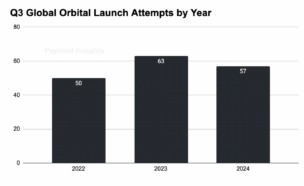Whether it’s being part of the Artemis Generation or harboring a greater appetite for adventure, Gen Z seems more enticed by the idea of traveling to the moon (even if today that remains a far-fetched proposition).
52% of Americans aged 18–34 say they’d be interested in visiting the moon if money were no object, per new polling from Axios and Momentive. That number drops to 35% for US adults aged 35–64, and 18% for those 65 and older.
- Worth noting: Everyone in the third demographic (65+) was alive the last time humans were on the moon.
- And…a dose of realism: 72% of respondents believe it’s unlikely humans will colonize and live on the moon in the next 10 years.
Industry findings: 65% of respondents believe it’s more likely than not that private space exploration companies will reach profitability within the next decade. And the lion’s share (53%) of respondents named SpaceX as the company leading the private sector’s push into space, followed by Blue Origin (12%) and Boeing (8%).




